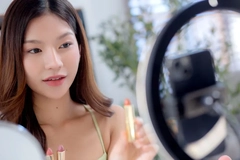Aesthetic doctor signals taurine as potential breakthrough ingredient for skin care

Taurine is becoming an increasingly popular bioactive ingredient in skin care due to its anti-aging and anti-inflammatory advantages.
There is a rising presence of clinical-grade, long-term results-driven skin care that targets cellular-level rejuvenation on the market. Taurine is a promising active with the potential to deliver functional skin benefits in these categories — however, the industry is yet to provide robust clinical data to assert its full efficacy.
Personal Care Insights speaks with aesthetic doctor Priya Verma about the ingredients’ potential to support skin hydration and combat environmental stressors.
“Taurine has the potential to establish itself as a valuable supporting active in skin care. While it may not serve as a primary ingredient for targeted treatment outcomes, its role in reinforcing skin hydration, cellular defence, and resilience against environmental stress makes it a versatile ingredient.”

“For taurine to become a consistent presence in advanced skin care formulations, more robust clinical studies and long-term efficacy data are needed. Evidence-based validation will be key to moving beyond novelty status and ensuring its integration into established skin care protocols.”
 Industry professionals position taurine as a promising anti-aging active. Cost-effective ingredient
Industry professionals position taurine as a promising anti-aging active. Cost-effective ingredient
Taurine is an amino sulfonic acid naturally produced in the body and found in the brain, eyes, heart, and muscles. One of its primary functions is to help the body maintain homeostasis, support immune health, and nervous system function. It is also found in animal-based foods that contain protein, such as meat, fish, and eggs.
“Research suggests promising taurine applications in dermatology. Taurine helps regulate hydration at a cellular level, protects against oxidative stress, and supports the skin’s barrier function, which makes it ideal for tired, stressed, or environmentally exposed skin,” says Dr. Verma.
“It helps skin cells retain moisture by reducing transepidermal water loss (TEWL), fights inflammation, and bounces back from damage caused by UV, pollution, or fatigue.”
As an ingredient formulated for beauty products, taurine is typically synthesized in a laboratory or produced through biotechnological methods rather than extracted from natural sources.
This method is more cost-effective, ensures consistency in potency, and supports ethical, vegan, and cruelty-free claims. Traditionally, it was derived from animal bile or tissues.
Beauty industry experts and skin care brands claim that products formulated with taurine can offer anti-aging benefits by restoring the skin’s natural moisture barrier. At the same time, it also provides antioxidant qualities by neutralizing free radicals, which contribute to cellular damage and premature aging.
Positive positioning
Unlike other emerging or polarizing ingredient trends, like beef tallow, taurine is gaining traction among industry professionals as a well-tolerated, multifunctional active that promotes long-term results.
In addition to its broad formulation appeal, it does not carry any ethical or chemical concerns that would make it harmful to the consumer. Its positioning offers versatility and sustainability, aligning with modern skin care market trends.
“I would recommend topical formulations containing taurine, particularly for patients experiencing skin fatigue, dullness, dehydration, or oxidative stress. Taurine’s antioxidant and osmoregulatory functions benefit it in supporting the skin’s resilience and maintaining cellular hydration under stress,” Dr. Verma says. Aesthetic doctor discusses the potential of taurine in future skin care formulations.
Aesthetic doctor discusses the potential of taurine in future skin care formulations.
“It may also be helpful for individuals with sensitive or mildly inflamed skin, as its anti-inflammatory properties can assist in calming irritation.”
She adds that, due to the ingredient’s natural occurrence in the body, it has a low risk of causing sensitization. However, Dr. Verma details limited data concerns surrounding taurine’s efficacy on various skin types, suggesting users with sensitive skin should patch test for reaction assurances.
“I have not seen significant reports of interactions or adverse events, but I would caution against relying solely on taurine for more advanced concerns like deep wrinkles or pigmentation.”
Actives and applications
Taurine, also known by the chemical name 2-aminoethanesulfonic acid, is used in skin care at a concentration of 0.1–1%, offering a functional dose. While taurine might not be as clinically established as active niacinamide or peptides, Dr. Verma maintains that it can be a valuable addition to skin care formulas to improve overall cellular function.
“Niacinamide and peptides remain well-established actives with strong clinical backing for their roles in improving skin tone, enhancing barrier function, and stimulating collagen production. While not yet supported by the same volume of data, taurine offers a complementary mode of action.”
“Rather than directly influencing collagen synthesis or pigmentation pathways, taurine primarily contributes to skin health through its roles in cellular osmoregulation, antioxidant protection, and mitochondrial support. These functions help maintain optimal cell performance and may indirectly support skin regeneration and resilience,” she adds.
Taurine can be applied topically in skin care products or taken orally as a dietary supplement. It is also a common ingredient in energy drinks, assisting in rehydration. However, she adds that topical applications would be more beneficial in targeting specific dermatological concerns.
“While oral taurine offers systemic benefits, its availability to the skin is limited as it gets broken down and distributed throughout the body,” she explains.
“Topical application enables taurine to act where it is most needed, within the epidermis and dermis, supporting hydration, reducing oxidative stress, and calming inflammation. The results will depend on the product’s formulation, i.e, adequate skin penetration, stability, and concentration — all important factors influencing efficacy.”
 Taurine in skin care claims to promote cellular-level skin rejuvenation and restore the skin’s moisture barrier.Brand endorsements
Taurine in skin care claims to promote cellular-level skin rejuvenation and restore the skin’s moisture barrier.Brand endorsements
Taurine’s inclusion in established brands’ products also signals its credibility as a functional ingredient that benefits skin health. According to information provided by Paula’s Choice, studies have revealed that natural taurine levels decrease with age, reducing the skin’s moisture content and contributing to wrinkle development.
Products formulated with this bioactive ingredient claim to offer a targeted skin care solution for consumers seeking to improve barrier resilience and reduce signs of aging associated with this decline.
The scientifically-led skin care brand SkinCeuticals leverages taurine’s moisture-boosting properties in their Cell Cycle Catalyst exfoliating anti-aging serum, formulated with a 7.7% multi-acid complex and 1% taurine.
The brand says: “This layerable serum accelerates skin surface renewal cycles and amplifies anti-aging results such as fine lines and radiance. Cell Cycle Catalyst is an optimal first step to boost the results of an anti-aging routine. It can also prepare skin ahead of professional chemical peels.”
Referring to taurine as a “potent renewing ingredient,” SkinCeuticals clinically backs claims that the amino acid amplifies anti-aging benefits by “activating cell energy and preventing TEWL.”
The serum was tested on all skin tones, with users applying it daily over an eight-week trial. Notable results were reported, with the appearance of pores, fine lines, wrinkles, and skin radiance improved — however, the number of participants was not disclosed.
Meanwhile, Clinique also highlights taurine as a beneficial ingredient in the skin care category, citing it as a “super ingredient” and “powerful fatigue fighter.” It is a key ingredient in the Clinique iD Active Cartridge concentrate for fatigue, helping to boost skin radiance and fight signs of fatigue caused by environmental stressors.













